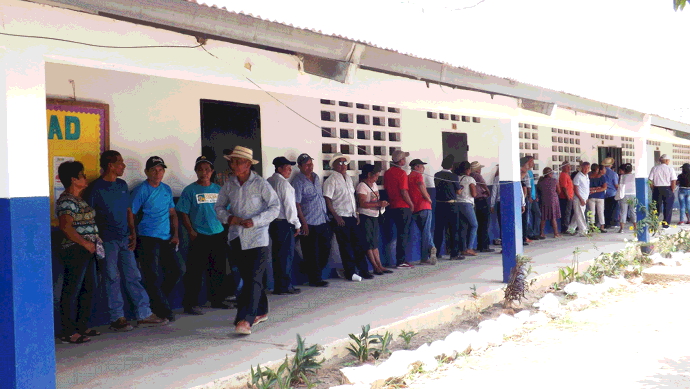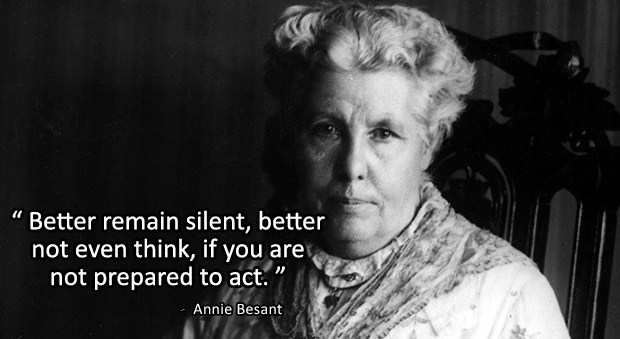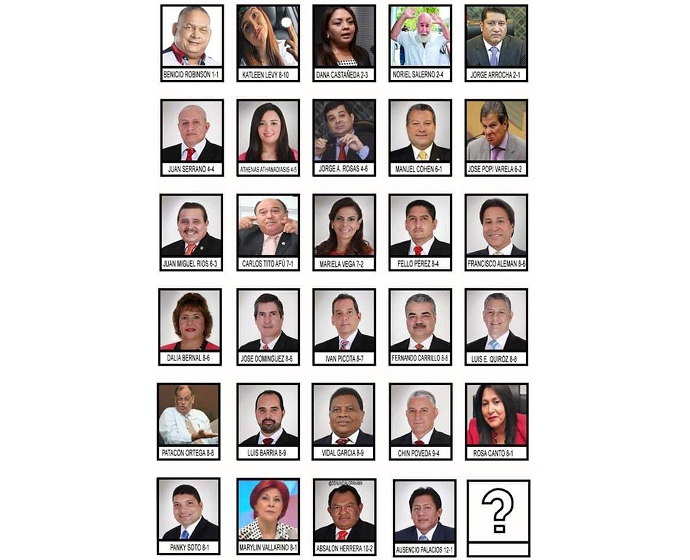We just shed this crowd of legislators. They will not be missed.
THESE parts of the problem were solved
Ana Matilde Gómez didn’t do so well running for president. She was an honorable exception in the National Assembly — she didn’t steal, or put her family on the payroll, or conceal how her office budget was spent. The body to which she had been elected got a reputation as a nest of thieves and people were not as careful as they should have been in determining who is what.
Most of the legislators who sought re-election were rejected. There will be some unworthy characters returning and there will be challenges to reverse the apparent results of the May 5 voting. Some of those challenges will have merit, but there is a structural problem in that one of the magistrates and the electoral prosecutor are so flagrantly partisan as to be unfit to hold any position in any part of the legal system.
Will the unworthy two consecutive legislatures passing a constitutional change method be even possible this time? Same old parties in different mixtures starting July 1, but will defeated deputies be so depressed as to only show up at the Palacio Justo Arosemena between now and then to pick up paychecks? Or will there be extra bribes paid to get them to show up and pass special interest constitutional patches? And will the next set of deputies want anything to do with what their predecessors may have passed?
The current legislature stole because they could. There should be prosecutions of both ex-deputies and those who are returning, but the non-aggression pact between the high court and the legislature and the general dysfunction of the Panamanian legal system make those undertakings doubtful.
Nito Cortizo comes in without party bosses embedded among the PRD’s delegation in the legislature. He has various options about with whom his minority PRD caucus might form an alliance to make a working majority. If President Varela broke his promise to convene a constitutional convention, it would be a good time for soon-to-be President Cortizo to break his promise not to and oversee such a badly needed overhaul. Neither he nor anyone else could fully control the eventual result, but a good leader could go a long way in that direction by framing the right questions about what the nation needs and what the people want.
It’s time for Cortizo and everyone else who was elected to start thinking as statesmen and stateswomen, and guardians of a troubled nation, rather than as candidates or party leaders. That’s asking a lot, but Panama needs a lot.

The wait in line was long, the day was hot and a cop was there to ensure order. But the people were decent and the officer did not need to intervene. We chose, without fighting among ourselves. However, we chose in a less than ideal context. Photo by Eric Jackson.
Constitutions and timely fixes
In the USA people often treat the Constitution as a sacred text, even when they have never read the thing. It was far from that. Within less than a century its breakdown led to a civil war in which more than 600,000 people were killed and the agricultural South was laid to waste and left in generations of poverty.
Panama had had more constitutions in its shorter history. The one we have now was conceived in a maneuver by a military dictatorship to give US politicians a democratic fig leaf to allow them to negotiate about the canal and the Canal Zone. There is none of the gringo constitution worship here for that document, with or without its subsequent patches.
To be relevant, constitutions have to evolve with the cultures and economic needs of nations. Let’s mention a couple of pressing constitutional issues and possible fixes for each nation.
In the USA the old compromise between big states and small ones broke down in the middle of the 19th century in a conflict between states that had slavery and those that didn’t. But nowadays that compromise is again breaking down into sectionalism that threatens the US status as an educational, scientific and industrial power. It’s not just the Senate and the Electoral College but it’s those things in particular.
As he was dying former US Representative John Dingell (D-MI) proposed part of a solution. It seems quite radical but would be a remake of the old compromise that stalls US government in so many ways these days. He suggested a unicameral Congress, with the Senate “folded into” the House. As in a Congress elected by districts of about equal population, but with each state electing two senators at large and these officials not only joining the House but for certain constitutional tasks — like approving treaties or judicial appointments — still meeting and voting separately as a Senate.
There are various proposals to eliminate or bypass the Electoral College. Better to just get rid of it, and have a direct popular election. In so doing, better to include the colonies — Puerto Rico, the US Virgin Islands, Guam and so on — in the voting to choose the US president who might draft them for a war, oversee disaster relief or so on.
In Panama our legislature is manifestly broken. One of the worst parts of it is the multi-member circuits that favor political parties over independent candidates, lend themselves to fraud and make it more expensive for somebody to run for office. Some business groups want to further skew the National Assembly in favor of the rich by reducing the number of its members and thus increasing the size of circuits and the cost of campaigns. This they would do under a faux populist banner of reducing the number of politicians. But for better government what should happen instead is that the multi-member districts should be eliminated and replaced with single-member districts, and a slightly larger national assembly. Were there, say, 101 smaller circuits with one member each, then someone without a lot of money could go around and personally meet many of the people in the circuit, taking campaigns retail and away from the television consultants.
Another big constitutional issue in Panama, although it does not immediately seem so, is our election cycles. Elect everyone every five years and all eyes focus on the presidential race, with lesser attention to anything else. Worse, electing everyone on this cycle means that for four out of five years government officials routinely ignore public grievances. The result of that? Blocking roads has become a costly and annoying part of our political culture for lack of anything else. Why not elect presidents for a once-in-a-lifetime six-year term, elect legislators for two-year terms and have local elections in the off years without national elections? That way, voting them out would be far more attractive and blocking traffic would make far less sense. The parties, of course, would hate it. Some mayor or representante paying the price for a national administration of his or her party neglecting a road or school in his or her bailiwick might also have reason to feel unfairly mistreated — but would also have an incentive to pester the national government about the particular problem.
So, facile little systemic fixes?
Not really. For one thing, in neither country is it easy to make important constitutional changes. More fundamentally, constitutions only work with the consent and cooperation of the people of the countries in which they are instituted. Get a large enough minority that wants to disrupt, and it will.

Bear in mind…
These links are interactive — click on the boxes












